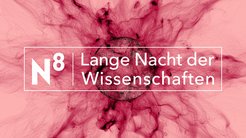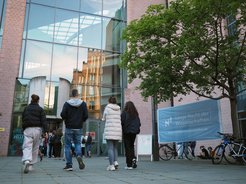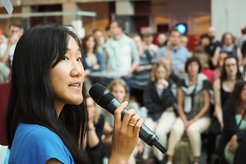Long Night of Science 2025
A look behind the scenes at the Max Planck Institute for Infection Biology
On June 28, Berlin will host its Long Night of Science. The Max Planck Institute for Infection Biology will open its doors to visitors for the “smartest night of the year.” Experience our research through lab tours, hands-on experiments, and lectures.

The countdown to the Long Night of Science has begun: On Saturday, June 28, those thirsty for knowledge can be inspired by experiments, lectures, science shows and guided tours in Berlin and Potsdam. The Max Planck Institute for Infection Biology is taking part - you can find our varied program here and on the LNDW website.
Our institute is located in the same building as the German Rheumatism Research Center. The German Rheumatism Research Center is also taking part in the Long Night of Science with many guided tours, stands and lectures.
The Long Night of the Sciences turns 25! The Long Night is celebrating its 25th anniversary with a special price - all tickets cost just 5 euros this year. Tickets are available here or at the box office.
Our program
The highlight of the evening is our Science Slam, together with the German Rheumatism Research Center. Six slammers from the two institutes will compete with their slams and offer not only science education but also great entertainment!
Anyone thinking about becoming a researcher is in the right place at our panel discussion and Q&A session "How to become a scientist". Scientists and employees from the two institutes will talk about their career paths. Our experts will answer your questions about paths into science and the requirements for starting a career as a researcher.

Mosquitoes in the middle of Berlin? At the Max Planck Institute for Infection Biology, scientists are researching the infectious disease malaria. Take the guided tour "The tropical laboratory life of mosquitoes" to see how our malaria researchers keep mosquitoes. Further information about malaria and hands-on games are available at our information stand "Malaria briefly explained".
We are also opening the doors to our zebrafish farm: on the guided tour "Tuberculosis research with zebrafish" you can find out how the lung disease tuberculosis is researched with the help of the small fish.
Another animal-themed tour awaits you on the tour of our frog husbandry "A frog with claws". Here you will learn how we keep African clawed frogs and use their egg cells to research the physical basis of the cell.
You can get to know the technical side of our research during the "Zoom-In" tour through our microscopy laboratory - from fluorescence microscopy to scanning and transmission electron microscopy and live cell imaging.

In his lecture "The microcosm in and around us - of protozoa and humans", research group leader Felix Key will give an insight into research into the microbiome and explain how he decodes the complicated relationships between humans and microbes.
In addition to mosquitoes, zebrafish and clawed frogs, our researchers are also working with a well-known pest from the kitchen: the fruit fly Drosophila melanogaster. On the guided tour "What does the fruit fly do in the lab", you can experience how the little flies are worked with in the lab. If you can't make it to the lab tour, you will find more information and hands-on experiments at our stand "The fruit fly, an ultimate animal model in immune research".
Further information on the use of laboratory animals at the institute is available at the information stand "Mouse, zebrafish & Co. - research with model organisms", where our animal keepers and animal welfare officers provide information on keeping experimental animals.
25 years of the Long Night of the Sciences Berlin | Potsdam
The Long Night of the Sciences has been held annually since 2001. From 5 p.m. to midnight, around 50 scientific and science-related institutions in Berlin invite visitors to take a look behind the scenes with spectacular experiments, exciting lectures, science shows and laboratory tours.
The events are spread across a total of five city areas - from the west to the center to Buch, from the southwest to the southeast. As always, the LNDW program is aimed at all age groups and offers special program items for schoolchildren.
The Long Night of the Sciences is largely organized and financed by the participating scientific institutions themselves. It is also supported by numerous partners from the region, in particular Berlin Partner für Wirtschaft und Technologie GmbH and Technologiestiftung Berlin.


